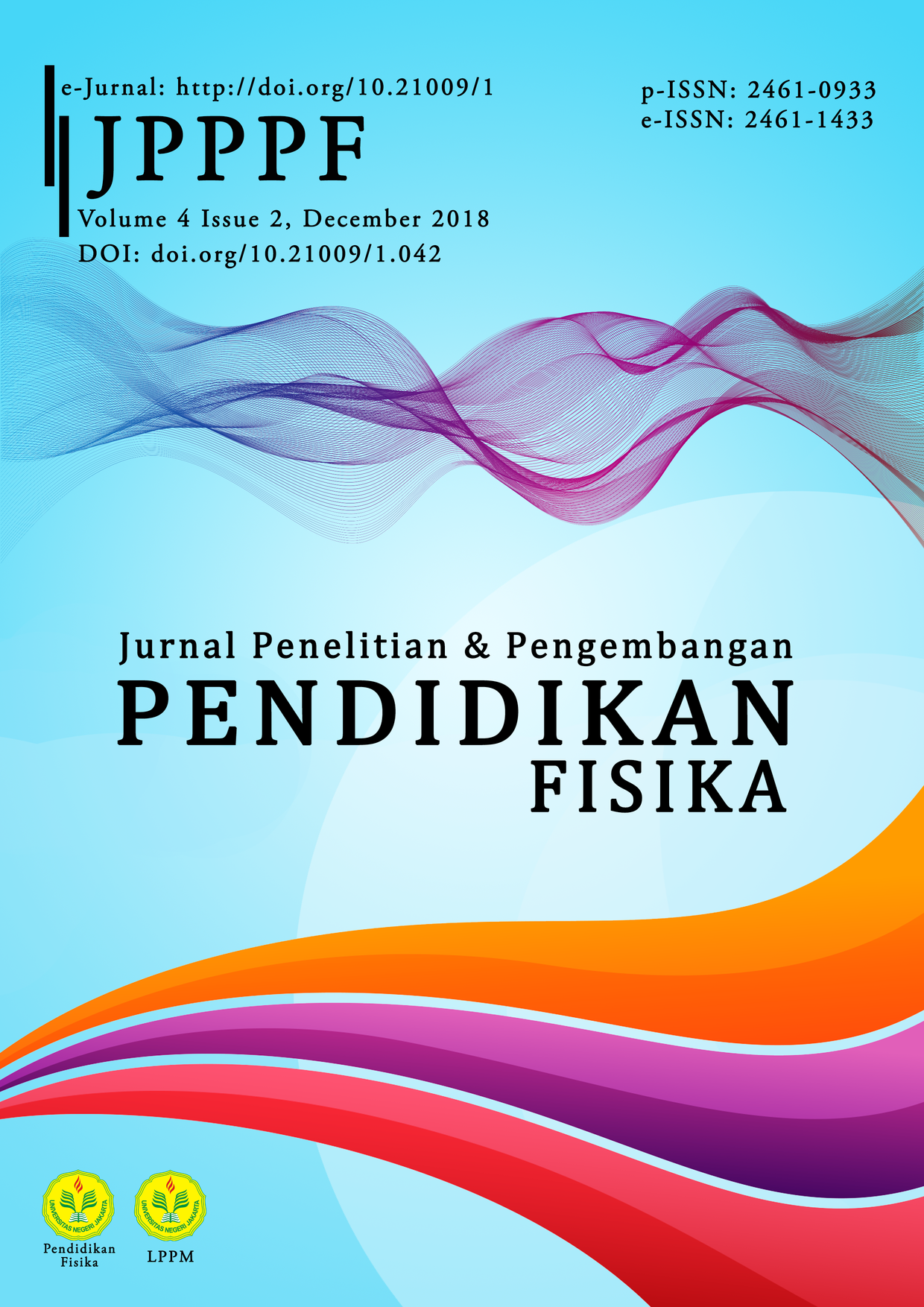The Development of Authentic Assessment Instrument to Measure Science Process Skill and Achievement based on Students' Performance
DOI:
https://doi.org/10.21009/1.04203Keywords:
authentic assessment, students’ performance, process science skill, cognitive achievement’s aspectAbstract
This study aims to develop an authentic assessment instrument based on students' performance. It can build the science process skill and measure the cognitive aspects of student’s achievement. The procedure of research & development method is adapted from Borg and Gall’s model, consisting collecting information, planning, early product development, preliminary field testing, first product revision, field testing, second product revision, and dissemination. The initial field testing was executed to 15 participants, and the field testing to 31 participants in MAN III Yogyakarta use the One – Shot Case Study model. The results of the study as follows: (1) instruments according to the experts' judgment, physics teachers and peers, in general, was valid, (2) instruments at the preliminary field test and main field test was reliable, and (3) instruments could build skills and measure cognitive achievement’s aspect of the scientific process skills of the senior high-school students for heat and temperature topic.
References
Antrakusuma, B, Masykuri, M, Ulfa, M 2017, ‘Analysis Science Process Skills Content in Chemistry Textbooks Grade XI at Solubility and Solubility Product Concept,’ International Journal of Science and Applied Science: Conference Series, vol. 2, no. 1, pp. 72-78, http://dx.doi.org/10.20961/ijsascs.v2i1.16682.
Aydogdu, B 2015, ‘The Investigation of Science Process Skills of Science Teachers in Terms of Some Variable,’ Academic Journals, vol 10, no. 5, pp. 582-294, viewed 26 November 2017, http://www.academicjournals.org/ERR.
Azwar, S 2014, The Arrangement of Psychology Scale, Pustaka Belajar, Yogyakarta.
Directorate of Coaching Senior High School 2010, Technical appraisal of affective scoring tools.
Earl, K, Giles, D 2011, ‘An-other Look at Assessment: Assessment in Learning,’ New Zealand Journal of Teachers Work, vol. 8, no.1, pp. 11-20, https://hdl.handle.net/10289/5766.
Hayat, B 2010, Classroom assessment principles and strategies, Center Research and Development of the Ministry of National Education, Jakarta.
Majid, A 2014, Implementation of Curriculum 2013 Theoretical Study and Practical, Interest Media, Bandung.
Maradona 2013, ‘Analysis Science Process Skill Student Class XI Science Senior High School Islam Samarinda on Subject Hydrolysis via Experiment Method,’ Proceeding of Chemist Nasional Seminar, Mulawarman University, Kalimantan Timur, pp. 62-70.
Morales, MPE 2015, ‘Influence of Culture and Language Sensitive Physics on Science Attitude Enhancement’, Cultural Studies of Science Education, vol. 10, no. 4, pp. 951-984, https://doi.org/10.1007/s11422-015-9669-5.
Nur, M 2011, Module of Science Process Skills, University State of Surabaya, Surabaya.
Powietrzyńska, M, Gangji, AKH 2016, ‘I Understand Why People Need to Ease Their Emotions: Exploring Mindfulness and Emotions in a Conceptual Physics Classroom of an Elementary Teacher Education Program,’ Cultural Studies of Science Education, vol. 11, no. 3, pp. 693-712, https://doi.org/10.1007/s11422-016-9772-2.
Safarati, N 2017, ‘The Effect of Model Scientific Inquiry Using Media Phet Toward Skills Process of Science Viewed From Critical Thinking Skills,’ Jurnal Pendidikan Fisika UNIMED, vol.6, no. 1, pp. 33-38, https://doi.org/10.22611/jpf.v6i1.6342.
Sartika, SB 2015, ‘Analysis Science Process Skill Student Prospective Teachers on Finish Question Integrated Science,’ Proceeding of Education Nasional Seminar, Mulawarman University, Kalimantan Timur, pp: 28-33.
Sianipar, VMB, Ansari K, Eviyanti E 2018, ‘Development of Authentic Assessment Instrument Based on Curriculum 2013 on Material of Poetry by Students Class X SMA Negeri 2 North Rantau Academic Year 2017/2018’, International Journal of Education, Learning and Development, vol. 6, no. 8, pp. 79-90.
Sugiyono 2013, Mixed Research Methods (Mixed Methods), Alfabeta, Bandung.
Suharto, PPTK IPA 2015, Teacher Training Materials Implementation Curriculum 2013 Year 2015 Madrasah Aliyah/Senior High School Subjects of Physics, Ministry Education and Culture, Jakarta.
Sumintono, B, Widhiarso, W 2013, Application rasch model: for research of the social sciences, Tim Komunikata Publishing House, Cimahi.
Suyidno, Jamal, MA 2012, Introduction Laboratory: Don’t Separate Science with His Laboratory, Intimedia, Malang.











